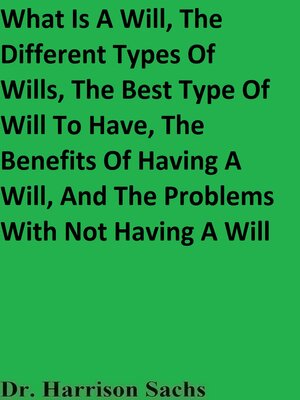What Is a Will, the Different Types of Wills, the Best Type of Will to Have, the Benefits of Having a Will, and the Problems With Not Having a Will
audiobook (Unabridged)
By Dr. Harrison Sachs

Sign up to save your library
With an OverDrive account, you can save your favorite libraries for at-a-glance information about availability. Find out more about OverDrive accounts.
Find this title in Libby, the library reading app by OverDrive.



Search for a digital library with this title
Title found at these libraries:
| Loading... |
This audiobook is narrated by a digital voice.
This essay sheds light on what is a will, demystifies the different types of will, explicates the benefits of having a will, and reveals the problems with not having a will. Succinctly stated, a will refers to a document that specifies how a person would prefer to have his assets distributed in the tragic event of his passing. If a person lacks a will, then his requests appertaining to how he would prefer to have his assets distributed in the tragic event of his passing are inapt to be granted. There are a copious amount of disparate types of wills. One common type of will is "a last will and testament". The "last will and testament" demystifies how a person would prefer to have his assets distributed in the tragic event of his passing. For instance, "a last will and testament" may instruct an executor of the estate to distribute a person's assets to other specific people, such as his family members or friends, in the event of his passing. The executor of the estate has the onerous burden of administrating the estate. The "last will and testament" can serve as "the foundation of an estate plan". Even though the "last will and testament" is not the only document that is utilized in an estate plan, it however can serve as the presiding document which is utilized to guide the lengthy process of settling an estate. The establishment of the "last will and testament" renders an estate all the more aptly poised to be settled in a manner that is aligned with the testator's requests in the event of his passing. A testator's beneficiaries that are listed in his "last will and testament" do not have to be limited to his friends and family members. For instance, a testator of "a last will and testament" is at liberty to have his assets doled out to organizations in the event of his passing. A testator of "a last will and testament" can even have his assets dispensed to a church in the event of his passing.






